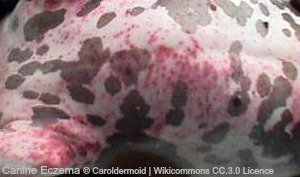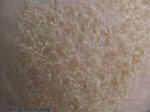Relieve Canine Eczema Symptoms. Make Your Dog An Itch Free Zone
Canine eczema can be just as sore and irritating for your dog as any of the types of eczema are for humans.
It is also known as acute moist dermatitis, atopic dermatitis and canine hot spots.

It can occur on any part of your dog's body.
It mainly affects the face or the underside of the body.
If your dog is carrying some extra weight then it may appear anywhere there are folds of skin.
It is more likely to affect dogs in the summer. Especially in long coated breeds, and in dogs that enjoy being outdoors a lot.
Symptoms
There a few symptoms that you can look out for to spot if your four-legged friend has canine eczema
- Skin inflammation. Redness or swelling
- Signs of itchiness. Itching, scratching or biting at the skin
- Hair loss. It can be caused by scratching
- Wet, matted coat. Either from trying to relieve the itch or from the skin weeping
- Blisters. They could have a crust on them
If your dog has eczema then there maybe some skin damage from any scratching and biting.
If you notice any of the above symptoms, go and see your vet. The quicker treatment can be started the better. It can help to reduce the risk of a bacterial infection, which can enter the skin through breaks in the skin.
Causes
Some of the causes of atopic dermatitis in dogs include
- contact with an allergen
- content with an irritant
- weather conditions
- stress
- fleas, a condition known as Flea Bite Dermatitis
Allergens and Irritants
If allergens or irritants are a cause, then you can try and limit the contact that your dog has with the offender. This is easier to do if you know what is causing the problem. But it isn't always the case.
To find the cause, you could keep a diary of
- where your dog goes
- what they have contact with
- what they eat
- when their symptoms worsen
This may help to narrow down what is affecting the skin.
There are many things
that can cause a reaction
- Detergents. Including cleaning products, be aware of which ones you use in your house
- Soap and shampoo. Ask your vet for suitable products to use
- Flea collars. If the neck area around the collar is affected you should remove it. There are natural products you can use
- Paint. If your dog brushes against walls, doors or anything painted it may cause a flare up
- Wool. You could use a bed or basket made of wicker or fleece
- Insecticides. Limit the use of them in your garden, or try a more natural way of controlling pests
Your dog could be affected by anything that could affect a human with eczema.
You can read more about some triggers of eczema, including weather and stress.
If keeping a diary doesn’t reveal anything, the next step could be to have an allergy test done. This will help to confirm any allergies or intolerances.
Treatments For Canine Eczema
There a couple of things that you could do to yourself to help your dog and their flare up
- Limit contact with any substance that is an allergen or irritant
- Regularly groom your dog and keep the hair short. This helps the skin to heal and also to see if any eczema is developing
- When your dog comes in from being outside pat them with a damp towel. This wipes any pollen or bugs off of their skin
To treat a flare up there are several different ways that your vet may suggest
- Topical treatment. This could be an topical emollient or a topical corticosteroid. One downside of this treatment is that your dog may lick it off. To stop that you could try a buster collar
- Glucocorticoids. Also
known as oral steroids. These would be given in a short course. They
would help if there was a large area affected by eczema
- Antibiotics. Fight any bacterial infection that your dog may have. That will help to clear the eczema quicker
- Antihistamines. Can reduce any itchiness. Helping to stop the itch-scratch cycle
There are also some natural ways to help treat canine eczema
- Oatmeal can be made into a paste and applied to the areas
- Food supplements, omega-3 fatty acids and vitamin E products are great for the skin
- Herbal fusions, chamomile is a good choice. Make a cup of chamomile tea, leave to cool, then apply to the affected areas gently using a soft cloth
You can read more about natural eczema treatments here. Just always check with your vet before using them.
If your dog has canine eczema you will know that it can be quite severe and distressing. If you can work out what is causing the flare ups and use the right treatments and precautions, it should clear up in time.
Always get professional advice from your vet. They will be able to diagnosis the condition. Then provide treatments and advice to help you to help your dog and their skin.
Return from Canine Eczema to Types of Eczema
Return from Canine Eczema to What is Eczema
Search What Is Eczema?
Advertising on What Is Eczema?
We are a participant in the Amazon Services LLC Associates Program, an affiliate program which allows sites to earn fees by advertising and linking to amazon.com. If you make a purchase through a link on this page, I may receive a small commission, at no extra cost to you. Many thanks
